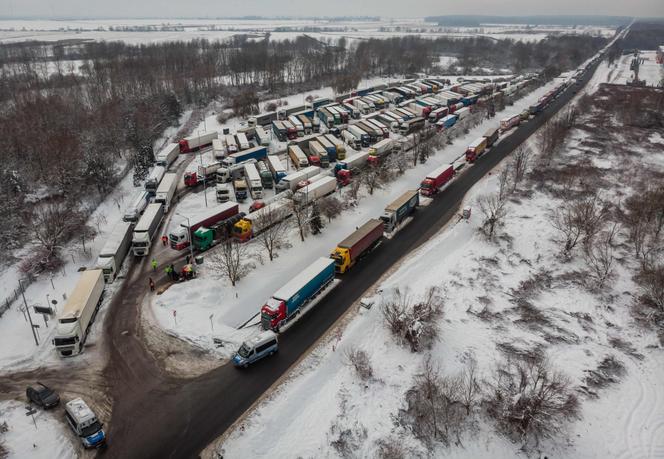


The start of a European Council summit on Thursday, December 14, to discuss Ukraine's accession to Europe will be tainted by the images of queues of Ukrainian trucks blocked at the borders of three member states of the European Union (EU). Slovak and Hungarian truckers have now joined Polish truckers who have been mobilized for over a month to denounce what they see as unfair competition by their Ukrainian counterparts.
On Monday, the Slovak transporters' union decided to block the country's border crossings indefinitely, having previously repeatedly blocked the Vysne Nemecke crossing, near the Ukrainian town of Uzhhorod. Not far away, a handful of Hungarian truckers were also setting up a picket at Zahony. These two small-scale protests went virtually unnoticed by the media, even though the queue in Hungary stretched for more than 10 kilometers.
The leaders of these two countries, which make no secret of their sympathy for Russia, have opted not to comment on the simultaneous action. "The situation is obviously beneficial to the Kremlin's rhetoric, even though we have no evidence of any direct Russian influence," said Kacper Wanczyk, a researcher at Warsaw University and former diplomat in charge of Ukraine.
In Poland, the situation is particularly tense and shows no sign of abating. On Monday, the mayor of Dorohusk, a town in the south-east of the country and one of the three border crossings blocked since November 6, withdrew the protesters' permits and deplored the situation of local entrepreneurs adversely affected by the paralysis. The protesters appealed the decision with support from a local leader of the far-right Polish party Konfederacja. A little further south, on November 27, farmers had protested the influx of Ukrainian grain on the Polish market – an issue that began poisoning bilateral relations in spring.
At the Hrebenne checkpoint, Maciej, who preferred not to give his last name for fear of reprisals in Ukraine, stood firm in front of his portable charcoal heater in -2°C temperatures on Wednesday, December 6. With the exception of humanitarian convoys, perishable foodstuffs and military equipment, he and his two comrades only let a few trucks through every hour. Fuel trucks were waiting along with the others. "We'll stay here until our demands are honored, we demand that the European Commission reinstate the authorizations it imposed on Ukrainian truckers before the Russian invasion," Maciej said.
At the end of June 2022, Brussels eased restrictions on Ukrainian carriers on European soil by doing away with the permits previously required. "Ukrainians had 160,000 permits before the war. Today they're not far from a million," said Maciej, who was wearing a yellow safety jacket. He added that his family business threatened to collapse "within a few months if nothing is done," a situation he blames on unfair competition from the Ukrainians: "Their wages and charges are lower, and we have European standards to meet that they're exempt from."
You have 30% of this article left to read. The rest is for subscribers only.
